If you’re exhausted from work, you’re not alone. 3 in 5 employees in the UK and US report feeling unable to deal with stress at work.
Now imagine if you felt happy at work, regardless of the deadlines, numerous deliverables, angry boss or demanding stakeholders. They can no longer stress you out and make you anxious.
Because you have a proven system to manage work stress, without having to compromise on your ability to achieve your goals and be successful!

Here are 12 research-backed activities to deal with stress at work easier. They’re split into 3 sections. Do at least 1 from each section as they complement each other:
- Activities to help you recover from the immediate stress.
- Positive habits to adopt to improve your resilience and ability to cope.
- Bad habits that are easy to ditch to reduce the amount of stress you experience in the first place.
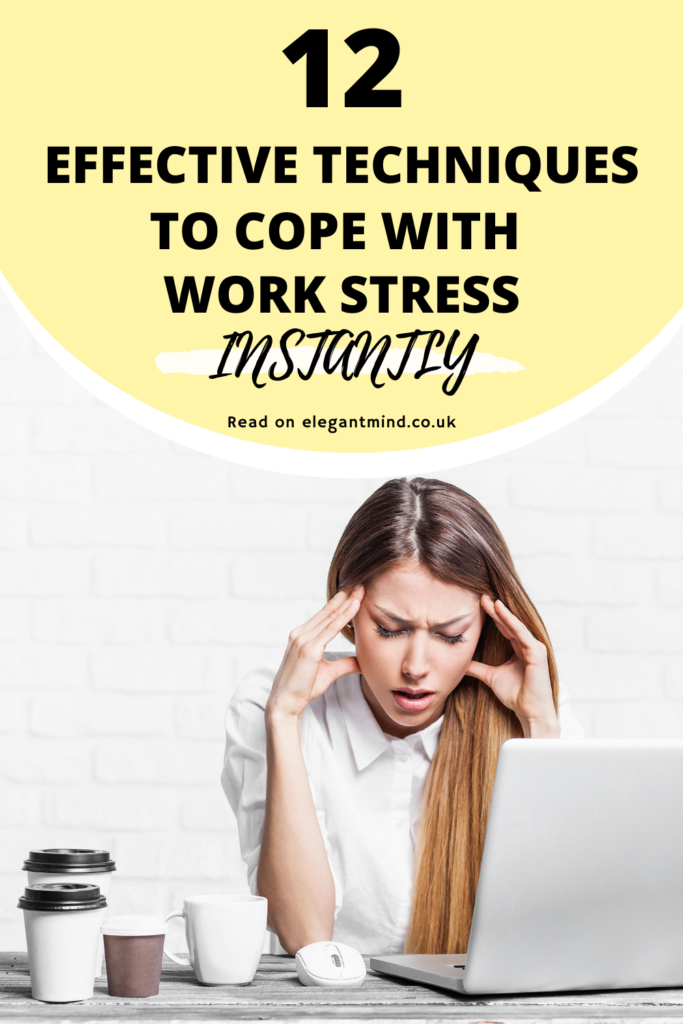
How to Deal with Stress At Work Step 1: Recover from the stress
After physically exhausting your body it needs time to recover and replenish its strength. Otherwise, you risk injuries.
Similarly, you need time to recover from the work stress because it exhausted your mental energy. Without adequate recovery, any initial stress reactions such as fatigue, low mood, and anxiety may develop into chronic conditions such as burnout.
Importantly, you must recover regardless if you like your job or not. Research suggests the following to be the most effective recovery experiences and in what circumstances they work best.
Exercise
Exercise (regardless of how vigorous) is the best recovery activity to achieve psychological detachment – the state of mental disconnect from work and job-related issues when you are away from your job.
So this is particularly important for workaholics and people who invest excessive time or effort in their job.

Relaxation
Meditation, bath, and massage are excellent recovery activities to give both your mind and body the rest it deserves. They work particularly well for recovery from busy, high work demands jobs such as teachers, nurses and doctors.
I personally combine meditation and bath in a weekly relaxation session. I don’t have the time to do it daily so I make sure it’s as relaxing as possible. And this ergonomic bath cushion has definitely helped to enjoy a soul-soothing bath like never before. It’s only £19 from Amazon UK / $29 from Amazon US and worth every penny. Get it HERE in the UK and HERE in the US.
Take Control of Something
Some jobs have no control. You’re told what to do and when to do it. And that’s fine.
But lack of control, especially in busy and demanding times, is proven to result in stress if it’s not counterbalanced by taking control outside of work. This could be how to spend your leisure time, a personal project which you’re entirely in control of, such as redecorating the house, learning a new skill such as knitting, coding, cooking, etc.
This will give you back a sense of control, mastery and accomplishment.
Get Social
Meaningful social interaction with your partner, friends, and family is also an effective strategy to detach from work. But here’s an interesting catch – if your occupation requires a lot of social interaction (e.g. sales, flight attendant, shopping assistant) then actually too much social interaction after work can have a reverse effect on your wellbeing as it continues to exhaust your emotional resources.
Improve Your Sleep Quality
Psychological research suggests we function best when we sleep for 7 to 8 hours. But if increasing your sleep quality is not an option, then focus on quality. The more relaxed you go to bed, the more deep sleep you will have. So you will wake up more refreshed in the morning. Here are 3 products which can improve your sleep quality.
Weighted Blanket
Medical research suggests a weighted blanket decreases anxiety, improves mood and promotes restful sleep and relaxation, through deep touch pressure therapy.
The science aside, dozens of women in my circle (and thousands on Amazon) swear by a weighted blanket to improve their sleep. For £29.99 The Brentfords weighted blanket below provides the best value for money!
Get it HERE from Amazon UK and HERE from Amazon US.
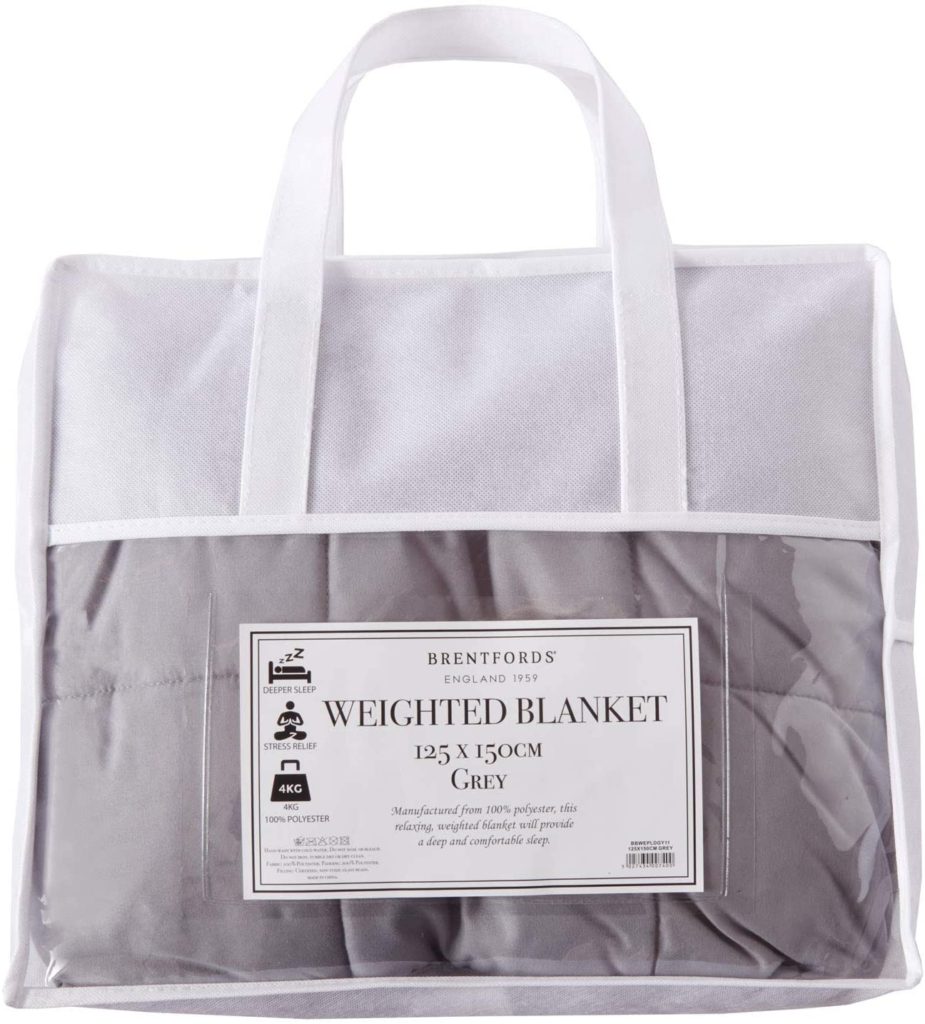
Calming Sleep Spray, Balm & Mask Set
The set from Sanctuary Spa includes a sleep mist spray, a warming body balm, a recovery face mask and a satin eye mask. Importantly, the calming fragrance is scientifically proven to help fall asleep quicker and for longer.
The sleep mask also limits the light which increases melatonin levels. Higher levels of this hormone make sleep deeper and less disturbed.
Get the set HERE for the UK and a very similar one HERE for the US.
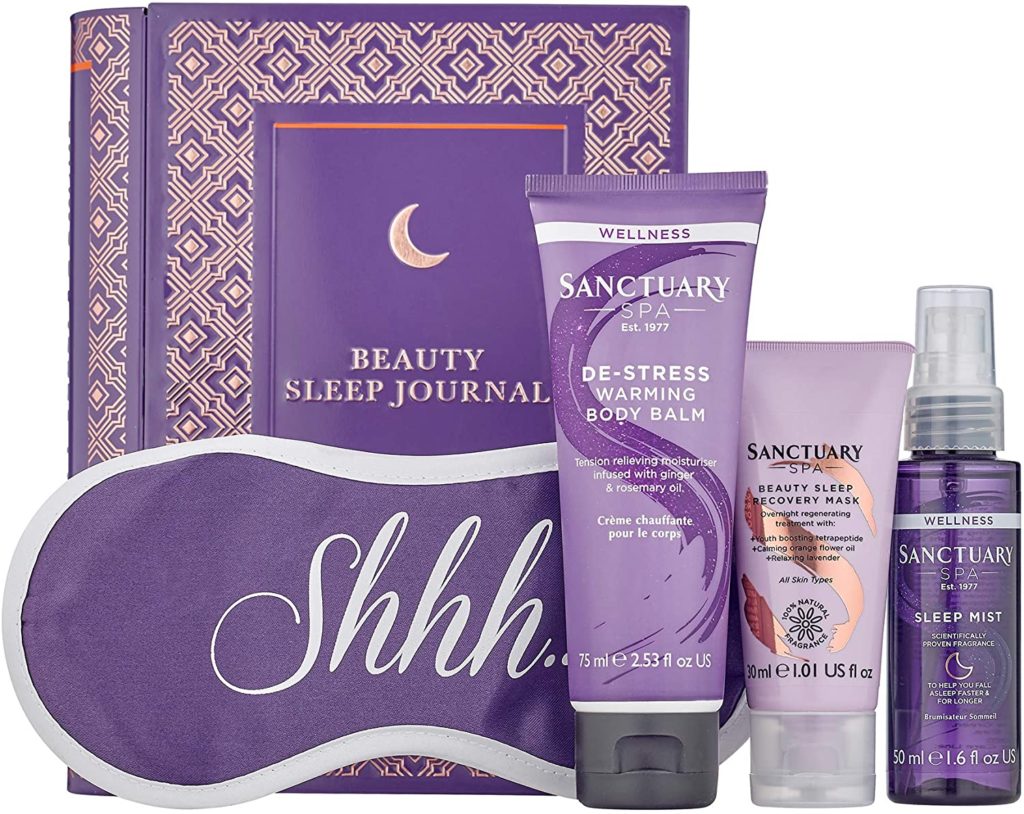
White Noise
White noise is used to improve baby sleep. But it can positively affect adult sleep as well.
We got this machine from Amazon when our son was 2 months old. It actually improved everybody’s sleep. I used to be easily awakened by noises outside the house and this is no longer the case. My partner used to wake up in the middle of the night and not be able to go back to sleep, sometimes for hours. This has completely stopped now.
Get the white noise machine from Amazon UK or Amazon US.
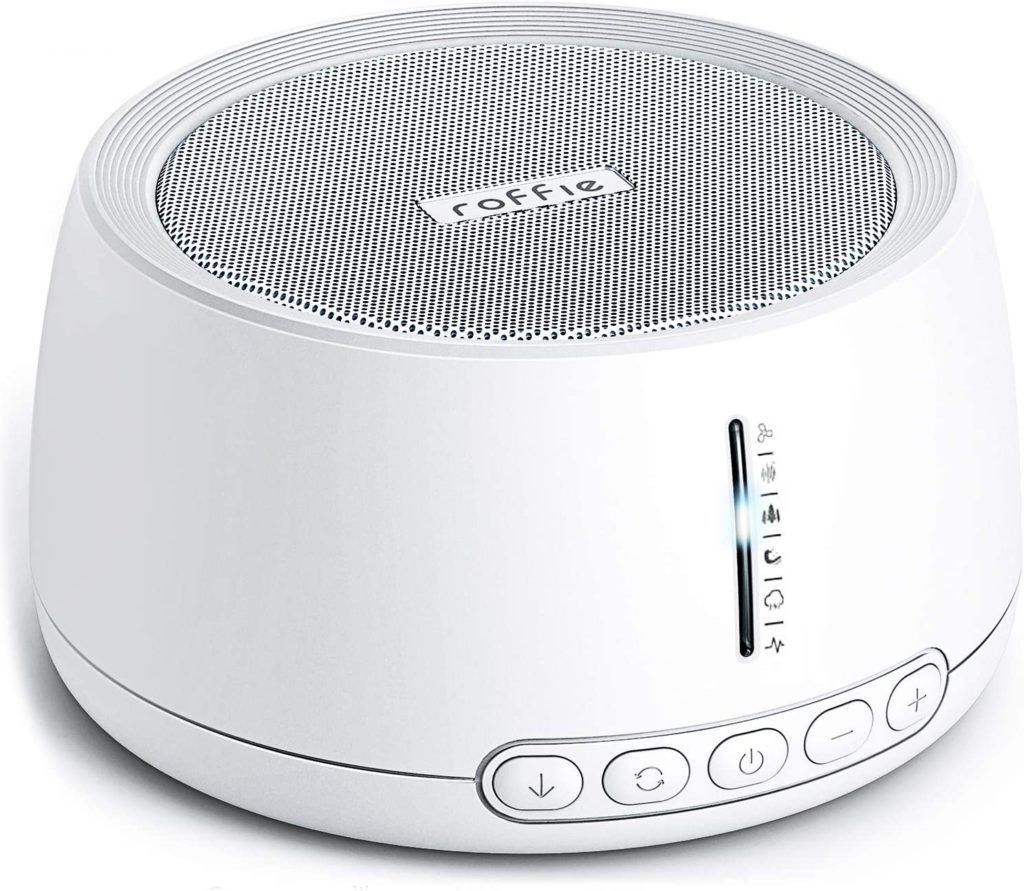
How to Deal with Stress At Work Step 2: Adopt Positive Habits
Adopting these 3 habits is proven to improve your resilience and help you deal with stress at work better.
Practice Gratitude
Practising gratitude as a daily ritual reduces stress hormones such as cortisol by as much as 23%. It also improves sleep quality, decreases blood pressure and lowers HRV (heart rate variability, i.e. sudden changes in your heart rate). This makes you feel less stressed and more relaxed. Recalling positive feelings of appreciation also switches your positive mindset on.
A Gratitude Journal is a perfect way to start this habit. This 6-Minute Diary combines a gratitude journal with a daily planner. With its prompts, it will guide you to spend 6 minutes a day (3 in the morning and 3 in the evening) practising gratitude, which will boost your productivity and happiness.
Plus you get the e-book “The Golden Morning Routine” for free!
Get the journal HERE for the UK and HERE for the US.
Practice Mindfulness
A daily dose of mindfulness enhances creativity, productivity, peace of mind and helps you manage work stress.
If you want to give mindfulness a go, try the Stress Less Cards. These mindfulness exercise cards are easy to carry out anywhere and at any time, even on the busiest days. So you will be guided to develop a happier, more mindful lifestyle over the course of 50 days.
Get the Stress Less Cards for £14.90 from Amazon UK and for $15.90 from Amazon US.
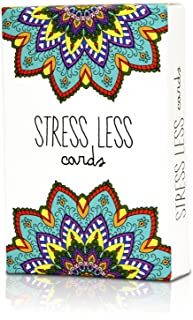
Adopt a positive mindset
This is a key activity if you want to not let work stress you at home too.
If you think and worry about work in your leisure time, your brain and body don’t realise you’re not actually at work. This results in poor mental health.
But if you adjust your mindset and think and reflect positively about work, this is good for your mental health and wellbeing. Even if you’re going through particularly tough times at work, it’s important to stay positive in order to sustain your efforts.
Here are what thoughts to watch out for and what to replace them with:
| Worry and a negative mindset | Constructive thinking and growth mindset |
| I worry about how I will deal with this last-minute project. If I fail this will have a huge impact on my career. | I know I have the skills to deal with this project. It may be challenging but it will give me an excellent opportunity to develop new skills and prove myself. |
| I have so many things on my to-do list. It makes me anxious and agitated. I’m not sure how I can cope. I’m at the point where I’m ready to ignore some of the tasks and dig my head in the sand. | I have so many things on my to-do list. But I have also completed many tasks. Besides, all projects will benefit my development and I just need to prioritise well. I will put a priority list tomorrow and discuss it with my manager. |
| I am useless. I just can’t think of ways to solve this problem. | I will be able to deal with this. Let me think of similar situations I’ve been in before. What did I do? Or can I check what others have done? Even Google may know the answer. This will help me put a plan together. |
How to Deal With Stress At Work Step 3: Change Bad Habits
These 4 bad work habits are linked to experiencing more stress and feeling overwhelmed, exhausted and unmotivated. The good thing is they can be changed easily!
Learn to Say No
There’s a strange feeling to saying No. Others may perceive you as not committed, pretending that you don’t have time, even incompetent.
But this is a mistake you make in your career in the long-term. By committing to many things you fail to prioritise your own wellbeing and risk burning out. So ask yourself:
- Is it my job to do it?
- Do I really have the time?
- Is it in line with my goals, professional and personal?
- Can I learn something from it, develop a new skill, or make a valuable connection?
- Will it have a positive impact on my performance appraisal or career growth?
- What would be the negative impact if I said ‘No’ (but remain objective! Don’t overthink it.)
If you can’t say ‘No’ then at least be realistic about a time frame. Is it a top priority? How long do you need to complete it? Overcommitting will cause you even more stress.
Take breaks
Hands up if the only breaks you take are to go to the toilet, walk to the meeting room (if you’re working in an office) or to prep your lunch. In the UK, only 1 in 5 people take their lunch break let alone other breaks. And 52% admit to eating on their desks.
Taking a short 5-min break every 1-2 hours improves productivity and the ability to reduce stress at work by recovering your mental and emotional resources. Without such recovery, stress reactions such as fatigue or low mood develop into chronic conditions such as burnout.
So if you notice you are 1) having difficulty concentrating, 2) making mistakes, 3) demotivated to keep going, 4) doing something for the 5th time without success – don’t push yourself. Here’s what to do instead:
- Go for a walk. The fresh air will clear your mind. You will also distance yourself from the problem, and look at things with fresh eyes.
- Do something for yourself – exercise, read a career book, update your personal development plan, or network with someone who can teach you something. These activities will recover your energy.
- Take your full lunch break. It is an important opportunity to detach from work halfway through the day.
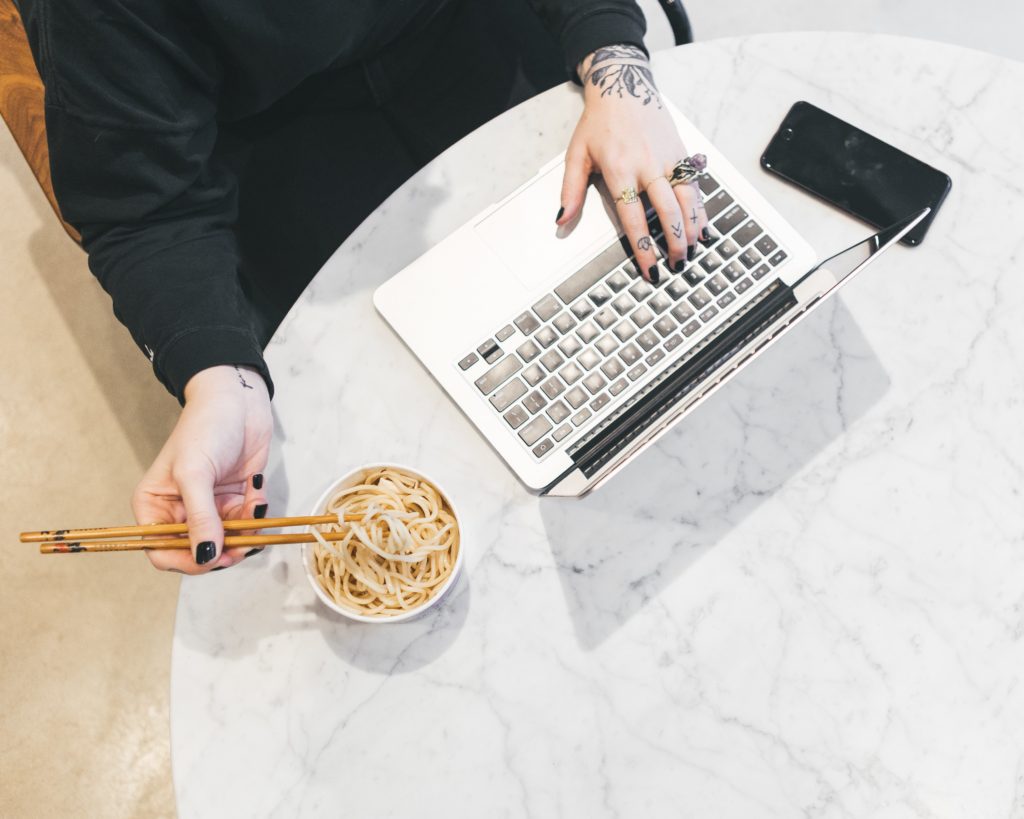
Stop Multitasking
How often do you try to multitask? Fill in a spreadsheet whilst talking to your colleague and keeping an eye out for new emails. But do you really save time doing these things at the same time?
Our brain cannot focus on more than one complex task at the same time. We can do automated things at the same time, such as walking and talking on the phone or driving and thinking about a work project. Because they rely on different brain areas which makes it possible. Work tasks require active thinking, planning, reasoning. These rely on the prefrontal cortex, an area of the brain involved in complex cognitive functions. And it can only process one complex task at a time.
So when you try to multitask you’re actually switching between tasks. Which in itself drains your resources even further as you continually change your focus.
So organise your day in chunks and do one thing at a time – dedicated time for emails (e.g. morning and after lunch), separate time blocked for different projects, small talks in your lunch breaks etc.
Reduce your Caffeine Intake

Caffeine is the world’s most widely used drug. It boosts metabolism and mood and improves mental and physical performance. We have developed a relationship with this magic drink which boosts our energy thus allowing us to combat work pressure.
But it’s a double-edged sword.
Caffeine increases breathing, cardiovascular activity and cortisol levels. In other words, when you drink too much coffee you feel exactly like you feel at super stressful times.
One study found that people who had 300 mg of caffeine experienced more than double the stress of those who took a placebo. So if you’re already under stress it’s certainly not a good idea to have much coffee!
So swap some of your caffeine drinks with an alternative such as a glass of lemon water, matcha tea, a refreshing walk outside, or natural energy and strength-boosting supplements such as Guarana extract or vitamin B.
Conclusion
Dealing with work stress is most effective when you combine an effective stress recovery activity, adopt positive habits, which increase your resilience, and ditch negative habits, which only make you more stressed. This, in turn, improves productivity, happiness and satisfaction with one’s work life.
But sometimes, regardless of how well you manage your work stress, things happening in your personal life take their toll. So coping with changes in your life impacts your work as well. Find out how to successfully cope with life changes, step-by-step, here.

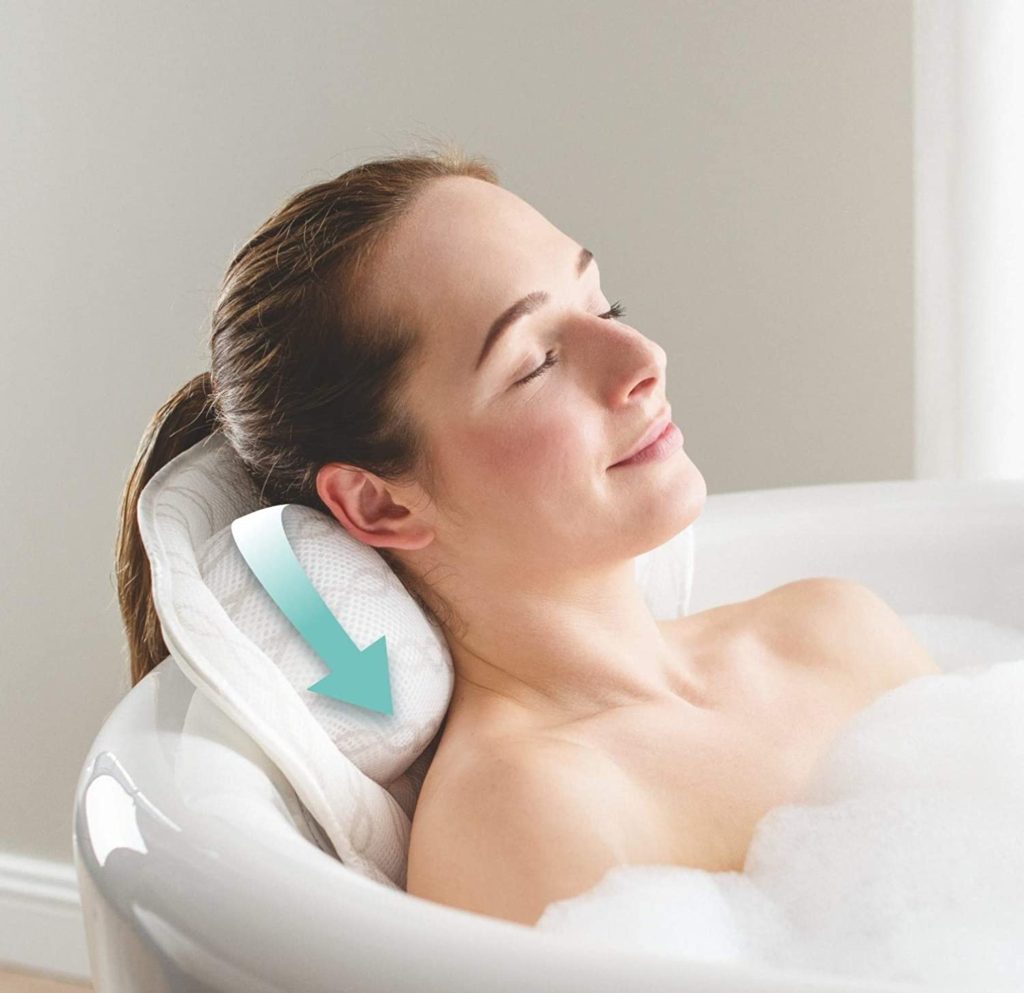














What do you think?